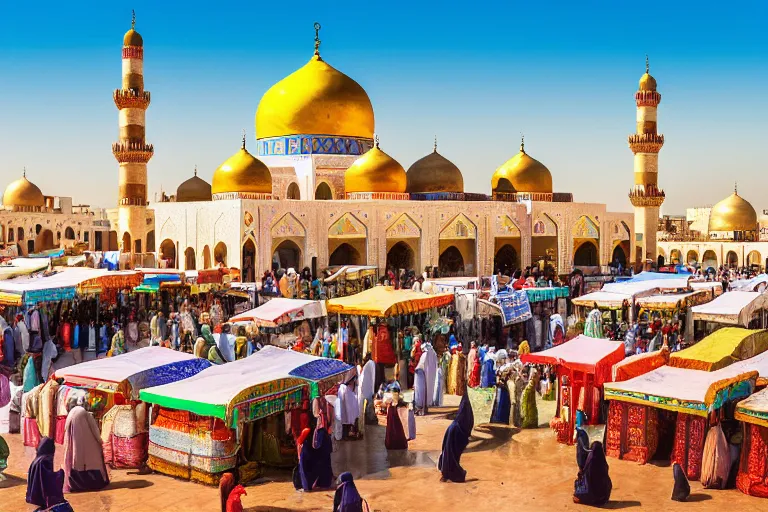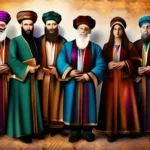Exploring the historical, cultural, and political factors that contribute to the implementation of strict religious laws in various Islamic nations.
This article delves into the complexities surrounding the enforcement of stringent religious laws in certain Islamic countries. We will examine the historical origins, cultural influences, and political dynamics that have led to this phenomenon.
The Historical Origins of Islamic Law
Imagine the birth of Islam as a beacon, guiding millions through the dark alleys of ignorance and superstition. The journey from the revelations in the Cave of Hira to the establishment of the first Islamic state in Medina laid down the foundational principles that would shape the future of many nations. But where did these strict religious laws originate? Could it be that they stem directly from the teachings of Prophet Muhammad himself?
The historical origins of Islamic law, or Sharia, trace back to a series of significant events and teachings. The Quran, believed to be the word of God as communicated to Muhammad, provided the initial framework. Its verses often addressed immediate social and legal issues, setting precedents for future legislation. But how did these early guidelines evolve into the complex system we see today?
The first caliphs played a crucial role in consolidating Islamic law. They had to balance the principles of Islam with practical governance needs, often interpreting and applying these principles in various contexts. This process was not without its challenges; it required careful consideration of both spiritual and temporal matters.
The evolution of Sharia also involved legal scholars known as ulema. Their interpretations, codified over centuries, have contributed significantly to the current understanding of Islamic law. But are these interpretations universally accepted? Or do they reflect the cultural and political contexts in which they were developed?
As we delve deeper into this history, it becomes clear that the roots of strict religious laws lie not just in divine revelation but also in the practical needs of early Muslim communities. These early foundations set a course for future development, influencing legal systems across generations.
Cultural Influences on the Interpretation of Islamic Law
Imagine walking through the bustling streets of a traditional Islamic city, where every corner seems to whisper tales of centuries past. These streets, lined with shops and homes that have stood for generations, are not just physical spaces but are woven into the fabric of cultural norms and values. How do these norms shape the interpretation and application of sharia law in different regions?
In countries like Saudi Arabia and Iran, the interpretation of sharia is deeply influenced by local traditions and historical practices. For example, in Saudi Arabia, the conservative Wahhabi school of thought has had a profound impact on the application of law. It’s as if the Wahhabis are the guardians of an ancient fortress, holding tightly to strict interpretations that have been passed down through generations. This can be seen in their approach to hajj restrictions or public behavior codes.
In Iran, meanwhile, the cultural influence is more intertwined with the political structure established after the 1979 Islamic Revolution. The mullahs who took power have not only shaped the legal framework but also the social norms that are reflected in daily life. This blend of sharia and cultural practices creates a complex landscape where traditional customs and modern interpretations coexist, often leading to unique challenges.
Cultural values such as respect for family honor, modesty, and communal harmony play significant roles in the application of law. For instance, the concept of nobat-e khoms (the fifth part tax) is deeply rooted in Persian culture and has been integrated into Islamic finance. It’s akin to a social contract where individuals contribute to common welfare, reflecting an older notion of community responsibility that predates even the advent of Islam.
The interplay between these cultural influences and legal interpretations creates a dynamic environment. It’s like trying to navigate through a maze where every wall is a different tradition or value, each one affecting how laws are perceived and applied. Understanding this complexity helps us see why strict religious laws in some Islamic countries are both deeply rooted in history and continually evolving with the times.
Political Dynamics and the Enforcement of Islamic Law
Political dynamics play a pivotal role in shaping the implementation and enforcement of strict religious laws in Islamic countries. How do governments balance the need for modernization and development with the demands of maintaining traditional values? Consider the metaphor of a ship navigating through turbulent waters; just as the captain must steer carefully to avoid capricious storms, political leaders must navigate their nations without losing sight of either shore—the past or the future.
One key aspect is the role of ideology. In some Islamic countries, the ruling parties or governments often adopt an ideological stance that prioritizes strict interpretations of Sharia law. This can be seen as a way to legitimize their rule and maintain control over their citizens. By emphasizing religious laws, these regimes create a framework where every action is scrutinized, ensuring compliance with their vision of societal order.
Another factor is the strength and structure of power within political systems. In highly centralized regimes, there’s less room for debate or dissent regarding the implementation of strict laws. Conversely, in more decentralized or pluralistic systems, there might be a pushback against such stringent regulations. This dynamic highlights how political power can either reinforce or challenge traditional religious norms.
The enforcement mechanisms also play a crucial role. Heavy-handed policing and judicial systems that prioritize religious law over civil rights can lead to a society where freedom of thought and expression is stifled. It’s like the hand of the state tightly gripping the strings, ensuring that no one strays too far from the prescribed path.
Moreover, international pressure and agreements also influence local laws. Western countries often advocate for human rights and civil liberties, which can clash with strict religious laws. This tension creates a complex interplay where nations must balance their traditional values with global expectations of governance and human rights.
Ultimately, understanding the roots of these strict laws requires delving into the intricate relationships between political ideology, power structures, and external pressures. Each country’s journey is unique, much like a fingerprint, reflecting its own history and challenges. By examining these elements, we gain deeper insights into why some Islamic nations have embraced such stringent religious regulations, shaping their societies in profound ways.
The Impact of Colonialism on Islamic Law
How did colonialism shape the landscape of Islamic law in former colonies, particularly in Africa and Asia? The answer lies in the complex interplay between historical events and cultural influences that have significantly altered legal systems over time.
‘Imagine a garden where each flower represents an indigenous culture, but one day, foreign hands transplant them into a new soil without understanding their unique needs.’
During the colonial era, European powers imposed their own legal and administrative structures on Muslim territories. They often dismissed or disregarded local Islamic laws and practices, replacing them with Western models. This shift was not just about codifying laws; it was an attempt to reshape societies according to foreign ideals.
- Loss of Autonomy: The loss of autonomy in legal matters meant that traditional Islamic scholars and jurists were sidelined or even marginalized. This disruption affected the natural flow of jurisprudence, as local interpretations and practices were stifled under new regimes.
- Cultural Assimilation: Colonial administrations often promoted a form of Islam that was more aligned with their own cultural and political objectives. This forced assimilation led to a hybridization of Islamic law, blending it with Western legal concepts in ways that sometimes conflicted with traditional values.
The impact of colonialism on Islamic law is profound and far-reaching. Even after independence, many former colonies continue to grapple with the legacy of these imposed legal frameworks. The challenge now lies in reconciling indigenous traditions with modern legal practices while preserving the essence of Sharia or Islamic law.
As we move forward, it is crucial to understand that the roots of strict religious laws in some Islamic countries are deeply intertwined with their colonial past. By acknowledging this historical context, we can better navigate the complexities and challenges faced by societies seeking to balance tradition and modernity.
Modern Challenges to Strict Religious Laws
When we delve into the modern challenges faced by those seeking to reform or challenge strict religious laws in Islamic societies, it’s like unraveling a complex puzzle. These laws, deeply embedded in cultural and political contexts, can seem almost as unyielding as ancient stone fortresses. But just as archaeologists painstakingly piece together fragments of history, we must explore the layers that make these strict laws so formidable.
One key challenge is the entrenchment of traditional interpretations. These views often stem from centuries-old legal and scholarly traditions, akin to deeply rooted trees whose roots spread far and wide. Reformers must first navigate this vast network of beliefs, which can be as intricate and resilient as a spider’s web. They face the task not just of changing laws but also of shifting the very mindset that has shaped generations.
Another significant hurdle is political resistance. Leaders who have built their power on the foundations of strict religious laws often view any challenge as an attack on their authority. It’s like trying to dismantle a carefully constructed castle with every stone glued together by fear and loyalty. Reformers must find ways to appeal not just to legal arguments but also to emotional and moral grounds, much like a diplomat seeking peace between warring factions.
Economic factors also play a crucial role. Many countries rely on religious tourism or certain aspects of their economy that depend heavily on strict interpretations of Islamic law. Reforming these laws could lead to economic repercussions, similar to altering the course of a river that supports entire communities. This makes the task even more daunting for those pushing for change.
Lastly, we cannot overlook the role of international pressure and support. While some countries may offer encouragement and resources, others might see challenges to strict religious laws as a threat to their interests. This global dynamic adds another layer of complexity, where reformers must navigate a web of alliances and rivalries.
So, in the quest to understand these modern challenges, we must consider not only the legal and cultural barriers but also the political, economic, and international pressures that come into play. It’s a multifaceted challenge, one that requires patience, persistence, and a deep understanding of the historical and contemporary forces at work.
The Global Implications of Strict Religious Laws
When we talk about strict religious laws in some Islamic countries, it’s like digging into a complex web of history, culture, and politics. How did these nations arrive at such stringent interpretations? Isn’t religion supposed to be about compassion and peace? Why does sharia take center stage in their legal systems, often overshadowing human rights?
Historically, many Islamic countries were built on a foundation of tradition and faith. Over centuries, these traditions intertwined with political power, creating a system where religious laws were not just moral guidelines but also the backbone of governance. This intertwining is like an old, sturdy tree whose roots have grown deep into the soil over generations. How do you uproot such deeply entrenched systems without causing chaos?
Culturally, these countries often place a high value on community and collective identity, which can make individual rights seem less important in comparison. The question becomes: how do we navigate this balance between preserving cultural heritage and advancing human rights? It’s like trying to steer a ship through turbulent waters without capsizing it.
Politically, the situation is even more nuanced. In many Islamic countries, rulers often use strict religious laws as a tool of control. These laws serve to maintain social order and reinforce the authority of the state. But at what cost? The potential global implications are vast: these strict laws can strain international relations and human rights issues both within and outside the country.
Take, for example, how these laws affect diplomatic relationships with Western nations that value human rights. It’s like a delicate dance where every step must be carefully measured to avoid upsetting the balance of power in global politics. Moreover, when religious laws are so strict they conflict with international human rights standards, it can lead to tensions and even sanctions.
Ultimately, understanding the roots of these strict religious laws requires us to look at all these factors together—history, culture, and politics. It’s a complex puzzle where each piece matters. How do we approach reform in such deeply ingrained systems? The answers are not simple, but they are crucial for building a more just and peaceful world.
Conclusion
 By the end of this article, readers will gain a deeper understanding of the multifaceted reasons behind the strict religious laws in some Islamic nations and the potential implications for global relations.
By the end of this article, readers will gain a deeper understanding of the multifaceted reasons behind the strict religious laws in some Islamic nations and the potential implications for global relations.











